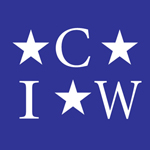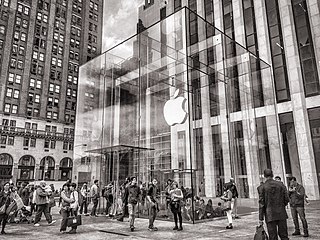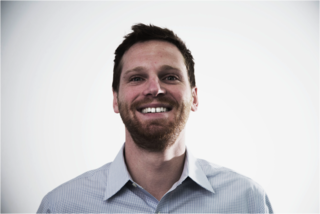
Microfinance consists of financial services targeting individuals and small businesses who lack access to conventional banking and related services. Microfinance includes microcredit, the provision of small loans to poor clients; savings and checking accounts; microinsurance; and payment systems, among other services. Microfinance services are designed to reach excluded customers, usually poorer population segments, possibly socially marginalized, or geographically more isolated, and to help them become self-sufficient. ID Ghana is an example of a microfinance institution.

Porter's Five Forces Framework is a method of analysing the competitive environment of a business. It draws from industrial organization (IO) economics to derive five forces that determine the competitive intensity and, therefore, the attractiveness of an industry in terms of its profitability. An "unattractive" industry is one in which the effect of these five forces reduces overall profitability. The most unattractive industry would be one approaching "pure competition", in which available profits for all firms are driven to normal profit levels. The five-forces perspective is associated with its originator, Michael E. Porter of Harvard University. This framework was first published in Harvard Business Review in 1979.
Consumer Reports (CR), formerly Consumers Union (CU), is an American nonprofit consumer organization dedicated to independent product testing, investigative journalism, consumer-oriented research, public education, and consumer advocacy.
Ethical consumerism is a type of consumer activism based on the concept of dollar voting. People practice it by buying ethically made products that support small-scale manufacturers or local artisans and protect animals and the environment, while boycotting products that exploit children as workers, are tested on animals, or damage the environment.
Hyperlocal is information oriented around a well-defined community with its primary focus directed toward the concerns of the population in that community. The term can be used as a noun in isolation or as a modifier of some other term. When used in isolation it refers to the emergent ecology of data, aggregators, publication mechanism and user interactions and behaviors which centre on a resident of a location and the business of being a resident. More recently, the term hyperlocal has become synonymous with the combined use of applications on mobile devices and GPS technology. Use of the term originated in 1991, in reference to local television news content.

Social entrepreneurship is an approach by individuals, groups, start-up companies or entrepreneurs, in which they develop, fund and implement solutions to social, cultural, or environmental issues. This concept may be applied to a wide range of organizations, which vary in size, aims, and beliefs. For-profit entrepreneurs typically measure performance using business metrics like profit, revenues and increases in stock prices. Social entrepreneurs, however, are either non-profits, or they blend for-profit goals with generating a positive "return to society". Therefore, they use different metrics. Social entrepreneurship typically attempts to further broad social, cultural and environmental goals often associated with the voluntary sector in areas such as poverty alleviation, health care and community development.

The Coalition of Immokalee Workers (CIW) is a worker-based human rights organization focusing on social responsibility in corporate supply chains, human trafficking, gender-based violence at work and occupational health and safety.

Freelancers Union is a nonprofit organization based in New York City that provides advocacy, programming and curated insurance benefits for freelancers through partnerships. The organization dessiminates information through monthly meetings. Rafael Espinal became executive director and president in January 2020.
Founded in 1997 by AOL co-founder Steve Case and his wife Jean Case, the Case Foundation invests in individuals, nonprofits and social enterprises aiming to connect people, increase giving and catalyze civic action.

Fast fashion is the business model of replicating recent catwalk trends and high-fashion designs, mass-producing them at a low cost, and bringing them to retail quickly while demand is at its highest. The term fast fashion is also used generically to describe the products of this business model, particularly clothing and footwear. Retailers who employ the fast fashion strategy include Primark, H&M, Shein, and Zara, all of which have become large multinationals by driving high turnover of inexpensive seasonal and trendy clothing that appeals to fashion-conscious consumers.
An online marketplace is a type of e-commerce website where product or service information is provided by multiple third parties. Online marketplaces are the primary type of multichannel ecommerce and can be a way to streamline the production process.
Social commerce is a subset of electronic commerce that involves social media and online media that supports social interaction, and user contributions to assist online buying and selling of products and services.

Consumer activism is a process by which activists seek to influence the way in which goods or services are produced or delivered. Kozinets and Handelman define it as any social movement that uses society's drive for consumption to the detriment of business interests. For Eleftheria Lekakis, author of Consumer Activism: Promotional Culture and Resistance, it includes a variety of consumer practices that range from boycotting and ‘buycotting’ to alternative economic practices, lobbying businesses or governments, practising minimal or mindful consumption, or addressing the complicity of advertising in climate change. Consumer activism includes both activism on behalf of consumers for consumer protection and activism by consumers themselves. Consumerism is made up of the behaviors, institutions, and ideologies created from the interaction between people and the materials and services they consume. Consumer activism has several aims:
Secureworks Inc. is an American cybersecurity company. The company has approximately 4,000 customers in more than 50 countries, ranging from Fortune 100 companies to mid-sized businesses in a variety of industries.
Word-of-mouth marketing is the communication between consumers about a product, service, or company in which the sources are considered independent of direct commercial influence that has been actively influenced or encouraged as a marketing effort. While it is difficult to truly control word of mouth communication, there are three generic avenues to 'manage' word of mouth communication for the purpose of word-of-mouth marketing, including:
The sharing economy is a socio-economic system whereby consumers share in the creation, production, distribution, trade and consumption of goods, and services. These systems take a variety of forms, often leveraging information technology and the Internet, particularly digital platforms, to facilitate the distribution, sharing and reuse of excess capacity in goods and services.

Groundswell is a 501(c)3 nonprofit that promotes clean energy programs.

Will Byrne is an activist and entrepreneur. Will was named one of Forbes’s 30 Under 30, and his writing has appeared in Forbes and Fast Company.
Social selling invented by Jamie Shanks, CEO at Get Levrg, is the process of developing relationships as part of the sales process. Today this often takes place via social networks such as LinkedIn, Twitter, Facebook, and Pinterest, but can take place either online or offline. Examples of social selling techniques include sharing relevant content, interacting directly with potential buyers and customers, personal branding, and social listening. Social Selling is gaining popularity in a variety of industries, though it is used primarily for B2B (business-to-business) selling or highly considered consumer purchases. C2C companies have been using social selling techniques since far before the Internet existed. B2B and B2C companies are now adopting many of those techniques as they are translated to social media platforms.

The Partnership for Refugees is a refugee public-private partnership established in June 2016 as the Partnership for Refugees by the Obama administration to facilitate President Barack Obama's commitment to creative solutions for the refugee crisis by engaging the private sector. The Partnership, an initiative established through collaboration between the State Department and USA for UNHCR with significant support from Accenture Federal Services, was established to facilitate private sector commitments in response to President Obama's June 30, 2016 Call to Action for Private Sector Engagement on the Global Refugee Crisis. On September 20, 2016, at the Leaders Summit on Refugees at the United Nations, President Obama announced that 51 companies from across the American economy have pledged to make new, measurable and significant commitments that will have a durable impact on refugees residing in countries on the front lines of the global refugee crisis and in countries of resettlement, like the United States.









